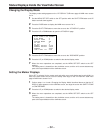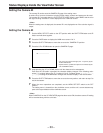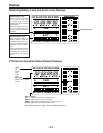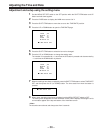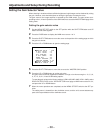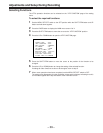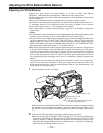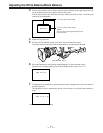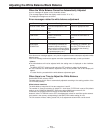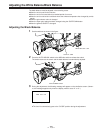
–70–
Adjusting the White Balance/Black Balance
Adjusting the White Balance
Adjusting the white balance and black balance in the order of AWB (white balance
adjustment)>ABB (black balance adjustment)>AWB will provide a better picture.
The black balance does not normally need to be readjusted even when the power is turned off and
then turned back on.
However, the white balance must be readjusted when the lighting conditions change.
If black balance and white balance adjustments are started when the display mode is set to “2” or
“3”, messages informing of the adjustment course and results will appear on the viewfinder
screen. Set the display mode to “1” to not display these messages.
ÁSee “Display Mode and Setting Change Message” (page 61) for a description of setting the
display mode.
|Notes{
ÁThe white balance and black balance cannot be adjusted while the setting menu appears on the
viewfinder screen. Therefore, be sure to set the MENU SET/OFF switch to OFF.
ÁThe auto black balance (ABB) must be readjusted without fail when the MASTER GAIN value
has been changed on the “LOW SETTING”, “MID SETTING” or “HIGH SETTING” SUB menu
pages of MAIN menu screen 1 of 4, when the super gain setting has been changed using the
SUPER GAIN button, and when the GAMMA setting (ON/OFF) on the “CAMERA SETTING”
SUB menu page of MAIN menu screen 1 or 4 has been switched.
ÁWith artificial lights, particularly with fluorescent lights and mercury-arc lamps, the strength of the
R, G and B colors changes in synchronization with the power line frequency even if the bright-
ness of these lights appears to be constant. Especially in areas where the power line frequency
is 50 Hz, the vertical synchronizing frequency (approx. 60 Hz) of the NTSC and the frequency
(50 Hz) of the lighting tend to interact. This gives rise to flicker and to a phenomenon where the
hue changes along with the passage of time, and it is it impossible to obtain the proper white
balance.
These phenomena can be reduced by setting the shutter speed to 1/100. For this reason, wher-
ever the unit is used under fluorescent or mercury-arc lamps and at a frequency of 50 Hz, the
shutter speed must be set to 1/100 and the white balance obtained. This shutter speed of 1/100
should also be used during shooting.
1 Set the switches as shown in the figure.
When the positions of the GAIN and WHITE BAL switches are changed, a message informing
the operator of the new settings will appear on the setting change message display area of
the viewfinder screen. (However, this display appears only when the display mode is set to
“3”.)
2 Select the FILTER knob setting in accordance with the lighting conditions.
ÁRefer to the description of the ¬ FILTER knob (page 15) in the Shooting and Recording/
Playback Function Section for examples of the FILTER knob settings. If the FILTER knob
setting is changed, a message informing the operator of the new setting will appear on the
setting change message display area of the viewfinder screen. (However, this display ap-
pears only when the display mode is set to “3”.)
GAIN: Normally, set to 0 dB. When it is too dark,
it is set to the appropriate gain.
MENU SET/OFF: OFF
WHITE BAL: A or B
OUTPUT: CAM
FILTER knob



